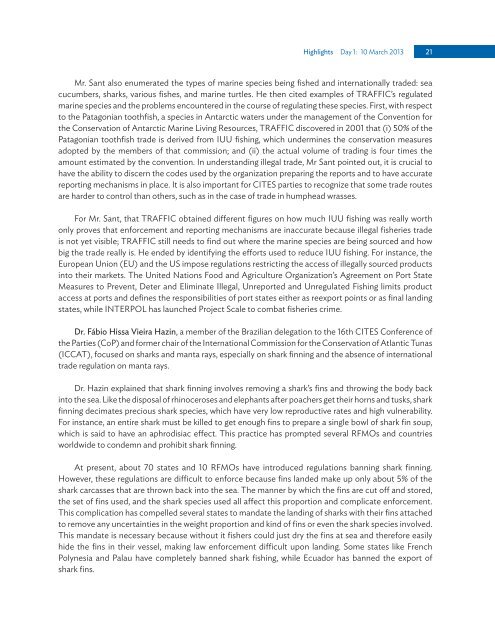ETEE7
ETEE7
ETEE7
Create successful ePaper yourself
Turn your PDF publications into a flip-book with our unique Google optimized e-Paper software.
Highlights Day 1: 10 March 2013 21<br />
Mr. Sant also enumerated the types of marine species being fished and internationally traded: sea<br />
cucumbers, sharks, various fishes, and marine turtles. He then cited examples of TRAFFIC’s regulated<br />
marine species and the problems encountered in the course of regulating these species. First, with respect<br />
to the Patagonian toothfish, a species in Antarctic waters under the management of the Convention for<br />
the Conservation of Antarctic Marine Living Resources, TRAFFIC discovered in 2001 that (i) 50% of the<br />
Patagonian toothfish trade is derived from IUU fishing, which undermines the conservation measures<br />
adopted by the members of that commission; and (ii) the actual volume of trading is four times the<br />
amount estimated by the convention. In understanding illegal trade, Mr Sant pointed out, it is crucial to<br />
have the ability to discern the codes used by the organization preparing the reports and to have accurate<br />
reporting mechanisms in place. It is also important for CITES parties to recognize that some trade routes<br />
are harder to control than others, such as in the case of trade in humphead wrasses.<br />
For Mr. Sant, that TRAFFIC obtained different figures on how much IUU fishing was really worth<br />
only proves that enforcement and reporting mechanisms are inaccurate because illegal fisheries trade<br />
is not yet visible; TRAFFIC still needs to find out where the marine species are being sourced and how<br />
big the trade really is. He ended by identifying the efforts used to reduce IUU fishing. For instance, the<br />
European Union (EU) and the US impose regulations restricting the access of illegally sourced products<br />
into their markets. The United Nations Food and Agriculture Organization’s Agreement on Port State<br />
Measures to Prevent, Deter and Eliminate Illegal, Unreported and Unregulated Fishing limits product<br />
access at ports and defines the responsibilities of port states either as reexport points or as final landing<br />
states, while INTERPOL has launched Project Scale to combat fisheries crime.<br />
Dr. Fábio Hissa Vieira Hazin, a member of the Brazilian delegation to the 16th CITES Conference of<br />
the Parties (CoP) and former chair of the International Commission for the Conservation of Atlantic Tunas<br />
(ICCAT), focused on sharks and manta rays, especially on shark finning and the absence of international<br />
trade regulation on manta rays.<br />
Dr. Hazin explained that shark finning involves removing a shark’s fins and throwing the body back<br />
into the sea. Like the disposal of rhinoceroses and elephants after poachers get their horns and tusks, shark<br />
finning decimates precious shark species, which have very low reproductive rates and high vulnerability.<br />
For instance, an entire shark must be killed to get enough fins to prepare a single bowl of shark fin soup,<br />
which is said to have an aphrodisiac effect. This practice has prompted several RFMOs and countries<br />
worldwide to condemn and prohibit shark finning.<br />
At present, about 70 states and 10 RFMOs have introduced regulations banning shark finning.<br />
However, these regulations are difficult to enforce because fins landed make up only about 5% of the<br />
shark carcasses that are thrown back into the sea. The manner by which the fins are cut off and stored,<br />
the set of fins used, and the shark species used all affect this proportion and complicate enforcement.<br />
This complication has compelled several states to mandate the landing of sharks with their fins attached<br />
to remove any uncertainties in the weight proportion and kind of fins or even the shark species involved.<br />
This mandate is necessary because without it fishers could just dry the fins at sea and therefore easily<br />
hide the fins in their vessel, making law enforcement difficult upon landing. Some states like French<br />
Polynesia and Palau have completely banned shark fishing, while Ecuador has banned the export of<br />
shark fins.





